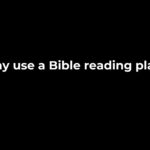A few days ago I wrote a brief reflection on my favourite chapter of the Old Testament – Isaiah 52:13-53:12. If that doesn’t make you want to leap for joy and praise the Lord, there is something seriously wrong with you. However, not every chapter in the Bible is intended to lighten our steps – some of them are meant to put weight in our souls. So it is with Deuteronomy 28.
Deuteronomy 28 is not my favourite chapter in the Bible. Not by a long shot. In it, Moses tells the people of Israel that they are not strong enough to live apart from the protection of the Lord. He tells them that if they forsake their covenant with the Lord, then they will be exposed to the power of their enemy and they will fall.
The Bible says that our enemy seeks only to steal, kill and destroy and this story reminds us that he will use every weapon in his arsenal and every minion in his power to erase and deface the image of God in us. If the Lord is not our fortress, then we shall utterly despair! This chapter describes that prophesied desolation in almost unreadable detail.
“They shall besiege you in all your towns, until your high and fortified walls, in which you trusted, come down throughout all your land. And they shall besiege you in all your towns throughout all your land, which the Lord your God has given you. 53 And you shall eat the fruit of your womb, the flesh of your sons and daughters, whom the Lord your God has given you, in the siege and in the distress with which your enemies shall distress you. 54 The man who is the most tender and refined among you will begrudge food to his brother, to the wife he embraces, and to the last of the children whom he has left, 55 so that he will not give to any of them any of the flesh of his children whom he is eating, because he has nothing else left, in the siege and in the distress with which your enemy shall distress you in all your towns. 56 The most tender and refined woman among you, who would not venture to set the sole of her foot on the ground because she is so delicate and tender, will begrudge to the husband she embraces, to her son and to her daughter, 57 her afterbirth that comes out from between her feet and her children whom she bears, because lacking everything she will eat them secretly, in the siege and in the distress with which your enemy shall distress you in your towns.” (Deuteronomy 28:52–57 ESV)
Siege warfare is brutal and dehumanizing. The Jews endured it twice, first during the Babylonian assault in 589-586 BC and then again under the Romans in AD 69-70. Prophecy became history in the writings of Flavius Josephus. He records the story of a woman named Mary, driven mad by her incessant hunger during the Roman siege:
“Famine gnawed at her vitals, and the fire of rage was ever fiercer than famine. So, driven by fury and want, she committed a crime against nature. Seizing her child, an infant at the breast, she cried, “My poor baby, why should I keep you alive in this world of war and famine? Even if we live till the Romans come, they will make slaves of us; and anyway, hunger will get us before slavery does; and the rebels are crueler than both. Come, be food for me, and an avenging fury to the rebels, and a tale of cold horror to the world to complete the monstrous agony of the Jews.” With these words she killed her son, roasted the body, swallowed half of it, and stored the rest in a safe place.”1
It is very hard to read a prophecy like the one we read this morning in Deuteronomy 28; it is ever harder when we know that it actually happened – twice in the history of the Jewish people.
This is one of those chapters from which we would rather look away.
We would rather imagine a God who was only mercy.
We would rather imagine a God who was slightly less antagonistic towards human rebellion and sin.
However, the Bible does not give us such a God.
The Bible describes a God who is three times holy. He is HOLY. HOLY. HOLY. He is who He is, and He is not subject to our judgment or approval. He is glorified in the display of His mercy and He is glorified in the display of His judgments.
That is what the Bible says.
That is what Deuteronomy 28 says and nowhere is that said more forcefully or more frankly than in Deuteronomy 28 verse 63.
And as the Lord took delight in doing you good and multiplying you, so the Lord will take delight in bringing ruin upon you and destroying you. (Deuteronomy 28:63 ESV)
Full disclosure: I have never preached a sermon on that verse and I’ve never heard one preached by anyone else. But I read it every year as I make my way through the RMM Bible Reading Plan. Every year, once a year, I am forced to wrestle with the most difficult verse in the Bible.
When I read it I am reminded, forcefully, that God delights in who he is and he is HOLY. HOLY. HOLY.
When I read it I am reminded that God’ actions and God’s words are never in conflict. God said this sort of thing about Himself; He said this was WHO HE WAS. He introduced Himself to Moses, who was hidden in the cleft of the rock, by saying:
“The Lord, the Lord, a God merciful and gracious, slow to anger, and abounding in steadfast love and faithfulness, 7 keeping steadfast love for thousands, forgiving iniquity and transgression and sin, but who will by no means clear the guilty, visiting the iniquity of the fathers on the children and the children’s children, to the third and the fourth generation.” (Exodus 34:6–7 ESV)
God is merciful. God is gracious. God is patient. God is loving. And God is just. He will by no means clear the guilty but will visit consequence upon people and upon communities in keeping with their actions.
That is who God is. Therefore, what He says in Deuteronomy 28:63 is entirely in keeping with His character. One commentator puts it this way:
“With this bold anthropomorphic expression Moses seeks to remove from the nation the last prop of false confidence in the mercy of God. Greatly as the sin of man troubles God, and little as the pleasure may be which He has in the death of the wicked, yet the holiness of His love demands the punishment and destruction of those who despise the riches of His goodness and long-suffering; so that He displays His glory in the judgment and destruction of the wicked no less than in blessing and prospering the righteous.”2
He displays His glory in the judgment and destruction of the wicked no less than in blessing and prospering the righteous.
That is a truth from which I am inclined to look away.
That is a truth that I am inclined to seek escape from. Perhaps this truth is in some way mitigated or clarified or negated in the New Testament, I wonder. But then I remember Revelation 20, which I read just last week:
“Then I saw a great white throne and him who was seated on it. From his presence earth and sky fled away, and no place was found for them. 12 And I saw the dead, great and small, standing before the throne, and books were opened. Then another book was opened, which is the book of life. And the dead were judged by what was written in the books, according to what they had done. 13 And the sea gave up the dead who were in it, Death and Hades gave up the dead who were in them, and they were judged, each one of them, according to what they had done. 14 Then Death and Hades were thrown into the lake of fire. This is the second death, the lake of fire. 15 And if anyone’s name was not found written in the book of life, he was thrown into the lake of fire.“ (Revelation 20:11–15 ESV)
God has not changed.
God does not change.
And he is not judged by me.
Today, by reading my Bible and seeing again what I try hard every year to avoid, I am freshly rebuked for my idolatry. I am reminded that I would lie to myself about the character and nature of God. I am reminded that I would dare to sit in judgment over the Lord.
I repent.
I am not God. I am not the judge. The Lord is just and right and good in all He says and does.
Thanks be to God!
Paul Carter
1 Flavius Josephus A History Of The Jewish Wars, The Wars Of The Jews, Book VI, Chapter 3.
2 C. F. Keil and Delitzsch F., Commentary on the Old Testament, Accordance electronic ed. (Peabody: Hendrickson Publishers, 1996), paragraph 2945.
















